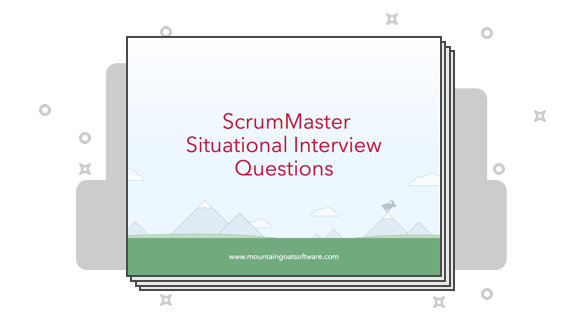
Interviewing Scrum Masters can be difficult because the job is harder than most to turn into a checklist of things a candidate needs to know and things a candidate will do. Much of the interviewing for a Scrum Master will be the same as interviewing for any other position, so I don’t want to spend a lot of time repeating general job interview advice in this post. Instead, I want to focus on things unique to the role of Scrum Master.
However, I do want to stress the importance of making sure candidates are comfortable during the process (interviews are stressful!) and asking open-ended questions. Also, spend time preparing for the interviews by thinking about what makes an ideal Scrum Master.
6 Desirable Attributes of a Good Scrum Master
While your list may differ, I have six things I look for in great Scrum Masters. As you interview each candidate, see how well candidates measures up against these criteria. At the end of each interview, I simply mark each candidate with a 1 to 5 score for each attribute, but any sort of marking scale you want will work.
- Responsible
Scrum Masters are able and willing to assume responsibility, but also know when to step back and let the team do so when appropriate. An orchestra conductor once explained that he has no real power over how the individual musicians play. Yet he feels a tremendous responsibility toward helping them be the best musicians they can be. AI good Scrum Master thrives on responsibility without power.
- Humble
Good Scrum Masters are not driven by their egos. You want a Scrum Master who puts the team’s needs above his or her own. I’ve been in sprint reviews in which a non-coding Scrum Master grabbed the keyboard and said things like, “Here’s what I had the team do …” and “Here’s what I had them build next …” That’s not the language of a humble Scrum Master. Perhaps, “Here’s what we did …” -- but even better: be quiet, and hand the keyboard to a team member.
- Collaborative
A good Scrum Master works to ensure a collaborative culture consistent with agile teamwork. The Scrum Master needs to make sure team members feel able to raise issues for open discussion. When disputes arise, collaborative Scrum Masters encourage teams to think in terms of solutions that benefit all involved rather than in terms of winners and losers.
- Committed
Some Scrum Masters take a laid back attitude toward the success or failure of the project. That’s not right. A good Scrum Master needs to be as committed to the success of a project as the team. I want to find candidates who will be tenacious in resolving impediments and highly committed to the ultimate success of the project.
- Influential
Scrum Masters often need to lead without direct authority. Being able to influence others is important. Some Scrum Masters achieve this through persuasive argumentation skills. Others through charisma and personality. It doesn’t really matter which method a Scrum Master uses. But Scrum Masters will need to influence team members as well as those outside the team, so being influential is a desirable trait.
- Knowledgeable
By knowledgeable I mean either of the technology or the domain. I put both of these in the “is a plus” category. I do not need a Scrum Master to be a former technical person. And I don’t need the Scrum Master to have worked in the domain of the project. But, each of these is a plus that could set a candidate apart from other candidates.
How Will a Scrum Master Perform?
Beyond looking for certain attributes of a Scrum Master’s personality, I want to assess how a candidate will perform in various situations. To do that, I like to ask a few situational questions of the candidate. For example:
The boss is at a trade show and needs two new unplanned features by tomorrow. Last week when this happened, you just put in a little overtime and wedged it in. Same thing the time before. If you don’t come through, it will cost you sales and your boss will be mad.
What do you do?
By asking questions like this, I put the Scrum Master in plausible, real-life situations and see how he or she will respond. I can then gauge whether I agree with the response, whether it’s reasonable, appropriate, and so on.
I like to combine hypothetical situational questions such as the one above with open-ended questions about the candidate’s own real experience such as:
- Tell me about the worst advice you ever gave a team.
- Tell me about one of the times you helped a team that you’re most proud of.
Questions like these are great because they give you insight into a candidate’s specific background. But I always include some hypothetical, situational questions because that allows me to more easily compare candidates.
Think about the question above with the boss wanting the new, unplanned features for the trade show. Imagine having heard answers to that from five different candidates for your open Scrum Master position. The answer to a question like that is often sufficient for me to know which candidate I want to hire.
Situational questions and a candidate’s answers to them can be a powerful tool in assessing who will be a good fit for an open Scrum Master job.
Last update: December 19th, 2024








